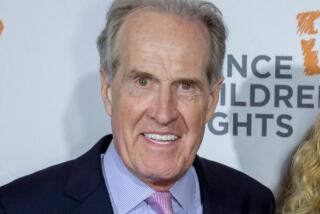American Arrives to Help Hussein’s Defense Team
- Share via
BAGHDAD — A prominent American antiwar activist arrived here Sunday to assist the defense team of Saddam Hussein when his trial resumes today, as reports surfaced of a plot to assassinate a top tribunal official.
Ramsey Clark, a former U.S. attorney general, was accompanied by Najib Nuaimi, a former Qatari justice minister.
“Our plan is to go to court in Baghdad on Monday morning representing defense counsel as defense support,” Clark told reporters before departing from Amman, Jordan. “A fair trial in this case is absolutely imperative.”
Clark was at the center of international efforts to prevent the March 2003 U.S.-led invasion of Iraq. Along with British Parliament member George Galloway, he was one of the most prominent Western critics of the invasion.
In the northern Iraqi city of Kirkuk, police officials announced the arrest of eight men accused of plotting to kill one of the top judges in the Hussein trial. Since their arrest four days ago, the men have confessed to planning to kill Raid Juhi, the investigative judge responsible for assembling the case against the former Iraqi president, police said.
Juhi has been the most public face of the trial and one of the few officials with the Iraqi High Criminal Court willing to appear on camera.
Also Sunday, the U.S. military announced the death of a Marine assigned to the 2nd Marine Aircraft Wing. He was killed Saturday when his vehicle struck a roadside bomb near Camp Taqaddum, west of Baghdad.
Two U.S. congressmen were injured when their military vehicle overturned Saturday on the way to Baghdad’s airport, the U.S. Embassy said. Rep. Tim Murphy (R-Pa.) was airlifted to a military hospital in Germany, and Rep. Ike Skelton (D-Mo.) was sent to a Baghdad hospital for evaluation, said Rep. Jim Marshall (D-Ga.), who was in the vehicle but was not hurt.
Officials were investigating reports that four aid workers -- two Canadians, a Briton and an American -- had been kidnapped. It was not clear for whom they were working. One of the missing was identified by his wife as Norman Kember, from northwest London. Canada’s Foreign Affairs Ministry said late Sunday that the government had confirmed that two Canadians were abducted.
When their trial resumes today, Hussein and seven co-defendants will face charges in the deaths of about 150 people in Dujayl, a Shiite Muslim village north of the capital. The killings were allegedly revenge for a failed 1982 assassination attempt against Hussein there.
Under tribunal guidelines, cases focus on incidents, such as the Dujayl killings or the 1988 poison gas attacks in Halabja, rather than on any one person’s alleged crimes.
The Dujayl trial opened for one day Oct. 19, then was delayed to give the defense team more time to prepare. The next stage is expected to last several days before adjourning until after the Dec. 15 parliamentary election.
Clark, who served as attorney general under President Lyndon B. Johnson, has worked for months as an advisor to Hussein’s legal team. But it is unclear whether he will be allowed into the specially designed courtroom deep inside Baghdad’s walled-off Green Zone.
Intense security procedures have surrounded the trial, including retinal screening and sometimes aggressive questioning of observers and journalists.
Lawyers for Hussein and the other defendants, who include the former president’s half-brother Barzan Ibrahim Hasan and former Vice President Taha Yassin Ramadan, have complained that inadequate security had made it impossible for them to do their jobs.
Two defense team members were killed in separate incidents shortly after the trial opened, prompting the remaining lawyers to threaten a boycott. They agreed to participate last week after Iraq’s government offered them personal security details and lodging in the Green Zone.
The team is expected to mount a dual defense -- challenging the authority of the tribunal while justifying Hussein’s deeds as the legitimate acts of a sovereign president seeking to maintain his country’s stability and national unity.
If convicted, Hussein and his co-defendants could face the death penalty. But several other trials could follow for incidents including the Halabja gassings, the 1990 invasion of Kuwait and the subsequent suppression of Kurdish and Shiite uprisings.
That process could take years, but several prominent Iraqi politicians have suggested dropping the remaining charges in favor of a quick execution on the Dujayl charges, if the defendants are found guilty.
*
Times wire reports were used in compiling this report.
More to Read
Get the L.A. Times Politics newsletter
Deeply reported insights into legislation, politics and policy from Sacramento, Washington and beyond. In your inbox twice per week.
You may occasionally receive promotional content from the Los Angeles Times.








